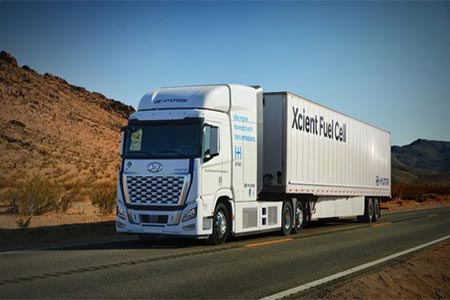Hyundai Motor Company has its plan to deploy the company's latest hydrogen fuel cell electric heavy-duty trucks in California, for two publicly funded projects to improve the air quality in the region.
The demo trucks that Hyundai will bring into the United States are developed based on XCIENT Fuel Cell, the world's first mass-produced, heavy-duty truck powered by hydrogen.
Debuting last year in Switzerland, XCIENT Fuel Cell has proven its commercial viability through more than one million kilometers of driving in real-world conditions. The U.S. model provides a maximum driving range of 500 miles, or about 800 kilometers.
Hyundai will leverage insights gained from these public projects to develop it's zero-emission commercial fleet business in the U.S. and establish local partnerships across the value chain.
Deploying 30 XCIENT Fuel Cell trucks in northern California by early 2023
Hyundai Motor teamed with public and private partners in the U.S. to operate 30 units of Class 8 XCIENT Fuel Cell trucks, starting from the second quarter of 2023. This will be the largest commercial deployment of Class 8 hydrogen-powered fuel cell trucks in the U.S.
A consortium led by the Center for Transportation and the Environment (CTE) and Hyundai Motor recently won $22 million in grants from the California Air Resources Board (CARB) and the California Energy Commission (CEC) and $7 million in additional grants from the Alameda County Transportation Commission and the Bay Area Air Quality Management District in support of this project.
Hyundai's NorCAL ZERO project, also known as Zero-Emission Regional Truck Operations with Fuel Cell Electric Trucks, will deploy 30 units of Class 8 XCIENT Fuel Cell, with a 6x4 drive axle configuration, to northern California by the second quarter of 2023. Glovis America, a logistics service provider, will be the fleet operator of these trucks. Macquarie's Specialized and Asset Finance business, part of its Commodities and Global Markets division, will finance the trucks through a lease to the operator.
"We are proud to fund this hallmark deployment of 30 hydrogen fuel cell electric trucks and improve the air quality in Northern California," said Hannon Rasool, Deputy Director of Fuels and Transportation Division at the California Energy Commission. "These investments will support zero-emission trucks and infrastructure development and deployment as part of the US market ecosystem. Public and private project partners have come together to take a big step forward in decarbonizing freight and goods movement, as part of CARB and CEC's clean air initiatives."
The consortium also plans to establish a high-capacity hydrogen refueling station in Oakland, California that will be able to support as many as 50 trucks with an average fill of 30 kilograms.
About CALIFORNIA CLIMATE INVESTMENTS
Zero-Emission Drayage Truck and Infrastructure Pilot Project is part of California Climate Investments, a statewide initiative that puts billions of Cap-and-Trade dollars to work reducing greenhouse gas emissions, strengthening the economy and improving public health and the environment — particularly in disadvantaged communities.
For more information to visit,http://worldwide.hyundai.com



